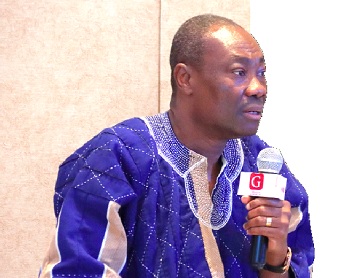
Let’s invest mineral revenue in productive assets — Martin Ayisi
There is the need to invest revenue from the nation's mineral resources in productive assets for a secure future, the Chief Executive Officer of the Minerals Commission, Martin Kwaku Ayisi, has said.
He said that would ensure succeeding generations did not lose out when the resources eventually ran out because natural resources were finite assets.
"Sustainability is important.
As we go about the exploration and exploitation of our natural resources, we should have at the back of our minds that revenue from it should be channelled into other ventures so that when the minerals run out we can fall on such investments," Mr Ayisi added.
He was speaking as a panellist on the topic: "Harnessing mineral resources responsibly for national development," at a two-day strategic stakeholders dialogue organised by the Graphic Communications Group Ltd (GCGL), in collaboration with the Ministry of Lands and Natural Resources, in Accra.
The event, which was on the theme: “Harnessing our natural resources for our sustainable collective good”, provided a platform for participants to deliberate and share practical perspectives on the nation’s progress about harnessing its natural resources for the sustainable collective good of the citizenry.
The Chile example
Citing the Chile example, Mr Ayisi said the country, which is the top copper producer in the world with 28 per cent of global copper production, was investing in fisheries and agriculture, and putting away much funds in sovereign bonds and other productive assets to secure inter-generational value.
"We must do the same so that whatever we are getting from the exploitation of our minerals must be channelled into other productive sectors so that when the minerals are exhausted we can have something to fall on," he said.
Banning small-scale mining
On small-scale mining, Mr Ayisi said the practice should not be banned but rather be regulated through the strict enforcement of laws to sanitise the sector.
He said small-scale mining took place in 13 out of the 16 regions in the country, apart from Oti, Volta and Greater Accra regions, while about three million people depended on the practice.
"We have to do it very well.
We must not look at the few in illegal operations to say we should shut down small-scale mining," Mr Ayisi added.
He said some 200 smaller scale miners were mining illegally at a community in the Upper East Region.
"Their activities had nothing to do with water bodies and when the chief of the area approached the commission, the place was carved out for them.
“We have given them two mercury-free processing machines which cost $300 to $1,000 to work and pay.
Their operations have, therefore, been licensed; they have their EPA permit and they are working lawfully," Mr Ayisi said.
He added that the commission had since constructed a borehole for the community at the cost of GH¢25,000.
In the Bole District also, the CEO said some 300 people were operating illegal mines " but you do not send the military after them.”
“We have sent them three mercury-free processing machines and formalised their operations which will translate into giving livelihood to 3,000 people.
“If we do it over the next five years we will see responsible mining.
The solution will not be overnight. It will require time to do this," he said.
